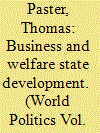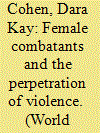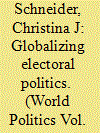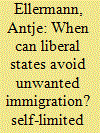|
|
|
Sort Order |
|
|
|
Items / Page
|
|
|
|
|
|
|
| Srl | Item |
| 1 |
ID:
121907


|
|
|
|
|
| Publication |
2013.
|
| Summary/Abstract |
In recent years, employer-centered explanations of welfare state development have begun to challenge conventional labor-centered and state-centered explanations. These new explanations suggest that sector-specific business interests and cross-class alliances propelled the adoption and expansion of social programs (the business interests thesis). This article presents a novel explanation of differences in business support for welfare state expansion based on a diachronic analysis of the German case and shadow case studies of Sweden and the United States. The article suggests that when looking at changes in employers' positions across time rather than across sectors, political constraints turn out to be the central factor explaining variation in employers' support for social reforms (the political accommodation thesis). The article identifies two goals of business intervention in welfare state development: pacification and containment. In the case of pacification, business interests propel social policy expansion; in the case of containment, they constrain it. Business chooses pacification when revolutionary forces challenge capitalism and political stabilization thus becomes a priority. Business chooses containment when reformist forces appear likely to succeed in expanding social protection and no revolutionary challenge exists. The article shows that changes over time in the type of political challenges that business interests confront best explain the variation in business support for labor-friendly social reforms.
|
|
|
|
|
|
|
|
|
|
|
|
|
|
|
|
| 2 |
ID:
121906


|
|
|
|
|
| Publication |
2013.
|
| Summary/Abstract |
Much of the current scholarship on wartime violence, including studies of the combatants themselves, assumes that women are victims and men are perpetrators. However, there is an increasing awareness that women in armed groups may be active fighters who function as more than just cooks, cleaners, and sexual slaves. In this article, the author focuses on the involvement of female fighters in a form of violence that is commonly thought to be perpetrated only by men: the wartime rape of noncombatants. Using original interviews with ex-combatants and newly available survey data, she finds that in the Sierra Leone civil war, female combatants were participants in the widespread conflict-related violence, including gang rape. A growing body of evidence from other conflicts suggests that Sierra Leone is not an anomaly and that women likely engage in conflict-related violence, including sexual violence, more often than is currently believed. Many standard interpretations of wartime rape are undermined by the participation of female perpetrators. To explain the involvement of women in wartime rape, the author argues that women in armed group units face similar pressure to that faced by their male counterparts to participate in gang rape. The study has broad implications for future avenues of research on wartime violence, as well as for policy.
|
|
|
|
|
|
|
|
|
|
|
|
|
|
|
|
| 3 |
ID:
121908


|
|
|
|
|
| Publication |
2013.
|
| Summary/Abstract |
This article analyzes electoral cycles in distributional bargaining in the European Union. The author argues that governments attempt to increase their EU membership benefits above average levels in the preelection period, hoping to appear politically competent to voters. The theory discusses when and how EU members can increase these gains before elections through negotiations in the Council of Ministers. A time-series cross-sectional analysis of EU member states' annual budget negotiations from 1977 to 2006 supports the existence of conditional electoral cycles in distributional bargaining and generally points to the importance of accounting for such cycles when analyzing patterns of international cooperation.
|
|
|
|
|
|
|
|
|
|
|
|
|
|
|
|
| 4 |
ID:
121910


|
|
|
|
|
| Publication |
2013.
|
| Summary/Abstract |
Why do trade unions organize antigovernment strikes in some countries but not in others? This article argues that there is a curvilinear relationship between union density and political strike activity. Political strikes are rare in countries with low union density, since effective protests require a basic level of organizational capacity. They are also rare in countries with high union density, since a government that faces a strong union movement has powerful incentives to adjust its policies in order to avoid open confrontation. But political strikes are relatively common in countries with moderate levels of union density, since it is difficult for governments and unions to find viable compromises when the strength of the unions is not secure. The empirical part of the article estimates the relationship between union density and the likelihood of political strikes in two samples of advanced democracies.
|
|
|
|
|
|
|
|
|
|
|
|
|
|
|
|
| 5 |
ID:
121909


|
|
|
|
|
| Publication |
2013.
|
| Summary/Abstract |
Advanced democracies, it is commonly argued, are unable to prevent unwanted immigration because their sovereignty is "self-limited" by virtue of their normative, legal, and economic liberalism. This article challenges this claim by examining a critical test case that is at the heart of self-limited sovereignty arguments: guest worker recruitment in postwar Switzerland and West Germany. The author shows that, contrary to conventional wisdom, the unintended settlement of guest workers was not a universal given but instead was far less extensive in Switzerland than in West Germany. This difference in exposure to unwanted immigration, she argues, was the result of path-dependent processes that can be traced back to the inception of each country's recruitment program. Whereas West German officials made no concerted effort to control settlement until the program's termination, Swiss policy from its beginning was marked by state-enforced worker rotation and the prevention of family unification. To account for these critical differences in policy design, the article argues that each guest worker system was fundamentally shaped by two sets of factors. First, program design varied depending on whether or not political elites could draw policy lessons from past experience with temporary worker programs. Where past recruitment had resulted in unwanted settlement, as had been the case in Switzerland, political elites sought to adopt policy provisions designed to prevent the past from repeating itself. Where past policy failure was absent, as was the case in West Germany, policymakers were less concerned with preempting settlement. Second, recruitment policy reflected the degree to which policymakers were able to operate autonomously from cross-cutting interests. Whereas the West German government could pursue recruitment relatively insulated from both business and popular pressure, Swiss policymakers had to repeatedly accommodate both sets of actors, in the process devising a recruitment system firmly premised on the principle of worker rotation.
|
|
|
|
|
|
|
|
|
|
|
|
|
|
|
|
|
|
|
|
|